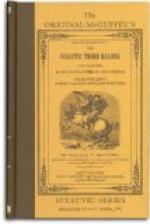X. THE GOOD SON. (44)
1. There was once a jeweler, noted for many virtues. One day, the Jewish elders came to him to buy some diamonds, to put upon that part of the dress of their high priest, which the Bible calls an ephod.
2. They told him what they wanted, and offered him a fair price for the diamonds. He replied that he could not let them see the jewels at that moment, and requested them to call again.
3. As they wanted them without delay, and thought that the object of the jeweler was only to increase the price of the diamonds, the elders offered him twice, then three times, as much as they were worth. But he still refused, and they went away in very bad humor.
4. Some hours after, he went to them, and placed before them the diamonds, for which they again offered him the last price they had named; but he said, “I will only accept the first one you offered to me this morning.”
5. “Why, then, did you not close with us at once?” asked they in surprise. “When you came,” replied he, “my father had the key of the chest, in which the diamonds were kept, and as he was asleep, I should have been obliged to wake him to obtain them.
6. “At his age, a short hour of sleep does him a great deal of good; and for all the gold in the world, I would not be wanting in respect to my father, or take from him a single comfort.”
7. The elders, affected by these feeling words, spread their hands upon the jeweler’s head, and said, “Thou shalt be blessed of Him who has said, ‘Honor thy father and thy mother;’ and thy children shall one day pay thee the same respect and love thou hast shown to thy father.”
Definitions.—l. Jew’el-er, one who buys and sells precious stones. Not’ed, well known. Eld’er, an officer of the Jewish church. Eph’od, part of the dress of a Jewish priest, made of two pieces, one covering the chest and the other the back, united by a girdle. 2. Di’a-monds, precious stones. 3. Hu’mor, state of mind, temper. 5. Close, come to an agreement.
Exercises.—Relate the story of the jeweler and his diamonds. What did the elders say to him, when they heard his reason for not giving them the diamonds at first?
XI. TO-MORROW. (45)
Mrs. M. B. Johnson is the authoress of “To-morrow,” one of a collection of poems; entitled “Poems of Home Life.”
1. A bright, merry boy, with laughing face,
Whose every motion was full of grace,
Who knew no trouble and feared no
care,
Was the light of our household—the
youngest there.
2. He was too young, this little elf,
With troublesome questions to vex
himself;
But for many days a thought would
rise,
And bring a shade to his dancing
eyes.
3. He went to one whom he thought more wise
Than any other beneath the skies;
“Mother,”—O
word that makes the home!—
“Tell me, when will to-morrow
come?”




